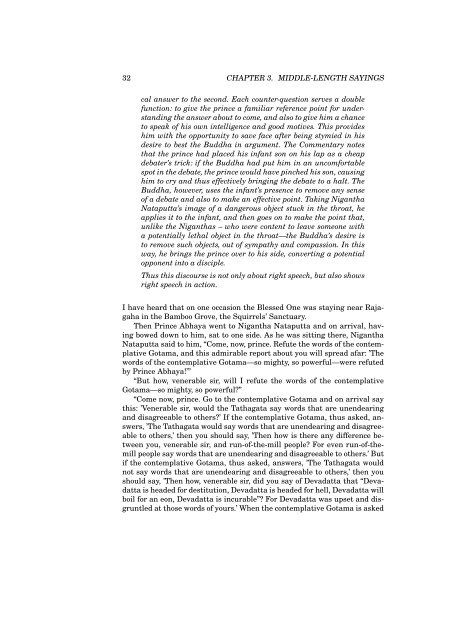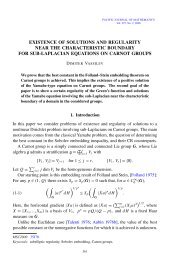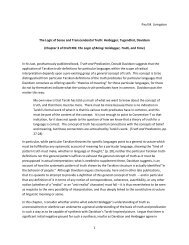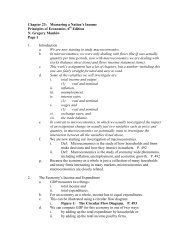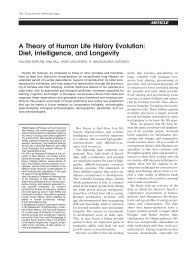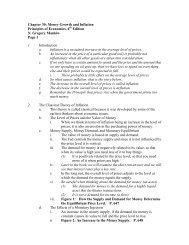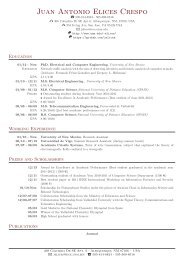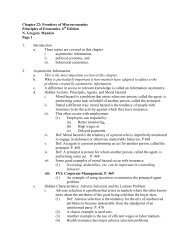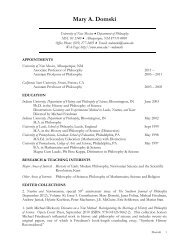Philosophy 438 Indian Buddhist Philosophy Buddhist Views of the ...
Philosophy 438 Indian Buddhist Philosophy Buddhist Views of the ...
Philosophy 438 Indian Buddhist Philosophy Buddhist Views of the ...
You also want an ePaper? Increase the reach of your titles
YUMPU automatically turns print PDFs into web optimized ePapers that Google loves.
32 CHAPTER 3. MIDDLE-LENGTH SAYINGS<br />
cal answer to <strong>the</strong> second. Each counter-question serves a double<br />
function: to give <strong>the</strong> prince a familiar reference point for understanding<br />
<strong>the</strong> answer about to come, and also to give him a chance<br />
to speak <strong>of</strong> his own intelligence and good motives. This provides<br />
him with <strong>the</strong> opportunity to save face after being stymied in his<br />
desire to best <strong>the</strong> Buddha in argument. The Commentary notes<br />
that <strong>the</strong> prince had placed his infant son on his lap as a cheap<br />
debater’s trick: if <strong>the</strong> Buddha had put him in an uncomfortable<br />
spot in <strong>the</strong> debate, <strong>the</strong> prince would have pinched his son, causing<br />
him to cry and thus effectively bringing <strong>the</strong> debate to a halt. The<br />
Buddha, however, uses <strong>the</strong> infant’s presence to remove any sense<br />
<strong>of</strong> a debate and also to make an effective point. Taking Nigantha<br />
Nataputta’s image <strong>of</strong> a dangerous object stuck in <strong>the</strong> throat, he<br />
applies it to <strong>the</strong> infant, and <strong>the</strong>n goes on to make <strong>the</strong> point that,<br />
unlike <strong>the</strong> Niganthas – who were content to leave someone with<br />
a potentially lethal object in <strong>the</strong> throat—<strong>the</strong> Buddha’s desire is<br />
to remove such objects, out <strong>of</strong> sympathy and compassion. In this<br />
way, he brings <strong>the</strong> prince over to his side, converting a potential<br />
opponent into a disciple.<br />
Thus this discourse is not only about right speech, but also shows<br />
right speech in action.<br />
I have heard that on one occasion <strong>the</strong> Blessed One was staying near Rajagaha<br />
in <strong>the</strong> Bamboo Grove, <strong>the</strong> Squirrels’ Sanctuary.<br />
Then Prince Abhaya went to Nigantha Nataputta and on arrival, having<br />
bowed down to him, sat to one side. As he was sitting <strong>the</strong>re, Nigantha<br />
Nataputta said to him, “Come, now, prince. Refute <strong>the</strong> words <strong>of</strong> <strong>the</strong> contemplative<br />
Gotama, and this admirable report about you will spread afar: ’The<br />
words <strong>of</strong> <strong>the</strong> contemplative Gotama—so mighty, so powerful—were refuted<br />
by Prince Abhaya!’”<br />
“But how, venerable sir, will I refute <strong>the</strong> words <strong>of</strong> <strong>the</strong> contemplative<br />
Gotama—so mighty, so powerful?”<br />
“Come now, prince. Go to <strong>the</strong> contemplative Gotama and on arrival say<br />
this: ’Venerable sir, would <strong>the</strong> Tathagata say words that are unendearing<br />
and disagreeable to o<strong>the</strong>rs?’ If <strong>the</strong> contemplative Gotama, thus asked, answers,<br />
’The Tathagata would say words that are unendearing and disagreeable<br />
to o<strong>the</strong>rs,’ <strong>the</strong>n you should say, ’Then how is <strong>the</strong>re any difference between<br />
you, venerable sir, and run-<strong>of</strong>-<strong>the</strong>-mill people? For even run-<strong>of</strong>-<strong>the</strong>mill<br />
people say words that are unendearing and disagreeable to o<strong>the</strong>rs.’ But<br />
if <strong>the</strong> contemplative Gotama, thus asked, answers, ’The Tathagata would<br />
not say words that are unendearing and disagreeable to o<strong>the</strong>rs,’ <strong>the</strong>n you<br />
should say, ’Then how, venerable sir, did you say <strong>of</strong> Devadatta that “Devadatta<br />
is headed for destitution, Devadatta is headed for hell, Devadatta will<br />
boil for an eon, Devadatta is incurable”? For Devadatta was upset and disgruntled<br />
at those words <strong>of</strong> yours.’ When <strong>the</strong> contemplative Gotama is asked


